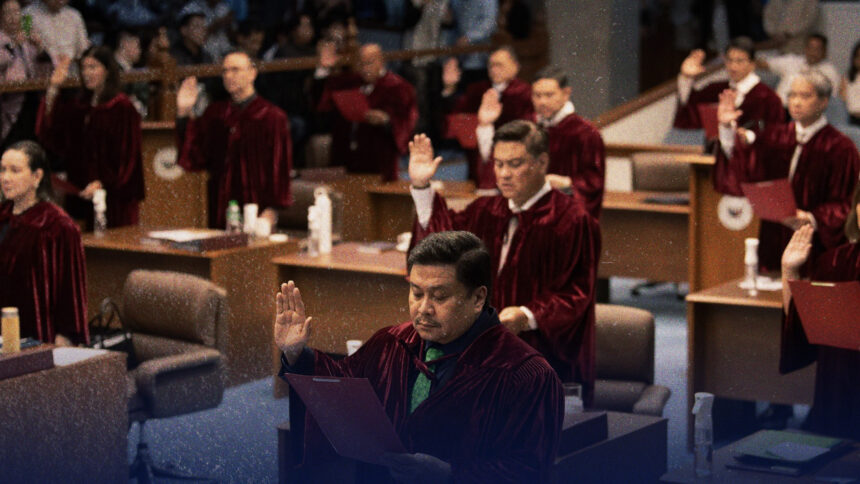In the courtrooms across the country, rituals unfold with silent precision. The clerk calls the case. The lawyers rise. The judge peers over the bench: “Appearances?” The rhythm of law presumes readiness—by both parties and the court. But in the most significant constitutional proceeding in over a decade—one placing the sitting Vice President under scrutiny—that assumption has failed. Everyone is ready.
Everyone except the Senate.
On December 14, 2011, the Senate convened as an impeachment court just a day after receiving the Articles of Impeachment against Chief Justice Renato C. Corona. Summons followed on December 15; his Answer, on December 26, a Christmas break. Then trial began on January 16 and a verdict was reached on May 29. Whatever one thought of the outcome, at least it was one. That Senate acted—not out of speed, but fidelity.
This one does neither.
On February 5, 2025, the House delivered an impeachment complaint against Vice President Sara Duterte, endorsed by over a third of its members. Four months later, the Senate has done everything except try it. First, it postponed to June 2. Then to June 11. Then, on June 10, it finally convened as an impeachment court—only to promptly un-convene. In a gesture worthy of Kafka’s bureaucracy, it returned the Articles without actually returning them. The Senate managed the rare parliamentary trick of acting by not acting—an institution caught in motion, avoiding movement.
The only real trial was watching it. And yes, it was trying.
Delay as Verdict
The Constitution could not be plainer. Once a verified complaint is filed and endorsed by at least a third of the House, “the same shall constitute the Articles of Impeachment, and trial by the Senate shall forthwith proceed.” Not when free. Not when convenient.
Forthwith is not forthwhenever.
In Chavez v. Judicial and Bar Council (2013), the Supreme Court held that Congress was entitled to only one JBC representative, not two, despite Congress being a bicameral, because the Constitution said “a” representative. The ruling wasn’t about grammar—it was about sovereignty. Congress could not substitute its plural desires for the singular will of the text.
The same logic applies here. “Shall” obliges. “Forthwith” compels. Silence—especially prolonged—violates.
That is where the deeper question lies. As constitutional law scholar Michael Gerhardt has noted in How Impeachment Works (87 Mo. L. Rev. 2022): impeachments ultimately “test nearly everyone.” Not the least of whom is the Senate: to render “impartial justice according to the laws and Constitution.”
So far, the Senate is failing that test.
Senate President Francis Escudero has cited every excuse on the shelf: House lethargy, campaign schedule, unfinished bills. Rather than heed the public’s call for accountability, he echoes only his chamber’s silence. Meanwhile, Majority Leader Francis Tolentino warns that if trial doesn’t conclude before June 30, it might simply vanish.
From one Francis to another, the logic proceeds smoothly—from delay to dismissal. This isn’t due process. It’s deep freeze. Never mind their law degrees or Ivy League attendance; their posture suggests not guardianship but abdication.
Here, delay is not dysfunction. It is the decision.
Forthwith “Recede”
On June 10, the Senate finally stirred. It took oaths. It put on the robes. Then, almost immediately, it folded the tent.
By a vote of 18–5, it adopted a motion by Senator Ronald “Bato” Dela Rosa—helped along by Senator Alan Peter Cayetano (and, by his own account, the “Holy Spirit”)—to “return” the impeachment complaint to the House, so it could submit a “certification” confirming it had followed the one-year bar rule. Legally, this bordered on farce. Dela Rosa, now sitting as a senator-judge, acted as movant, advocate, and adjudicator—all in one breath. No real court would allow that.
Worse, the certification requirement Cayetano insisted on wasn’t just misplaced—it was wholly invented. It was off the record, literally. Plucked from thin air, raised by no party, and answered by no one. The defense never brought it up. The House wasn’t even in the room. And yet, the Senate debated it anyway—like judges riffing off gossip.
Senator Koko Pimentel, to his credit, cut through the confusion: if a certification is truly missing, why not just ask for it? The answer, of course, is plain. Delay—not documentation—was always the point.
Even so, the entire debate was built on sand. In Francisco v. House of Representatives (2003), the Supreme Court made clear: an impeachment complaint is “initiated” only upon referral to the House Committee on Justice. None of the three earlier complaints reached that stage. This one took a different route straight to the Senate’s lap.
Which brings us to the real maneuver: by asking the 20th Congress to reaffirm a complaint filed during the 19th, the Senate has created the perfect procedural dodge. Translation: stall until the membership changes. Let time—not trial—do the acquitting.
In the meantime, the impeachment summons—normally just a formal “please answer this”—now floats in limbo. If the complaint has been returned, what exactly is the Vice President expected to respond to? Can a case be both sent back and still on the docket? Even trial logic—notice, response, judgment—has been turned on its head.
At this point, the complaint exists in a kind of quantum state. Like Schrödinger’s cat—neither dead nor alive—it is both valid and void, both pending and dismissed, depending on who opens the box. The Senate has effectively placed the Constitution in a sealed chamber and insists that no one peek until session resumes.
But impeachment was never meant to be quantum physics. It is a political judgment wrapped in legal form—a test of whether institutions can confront questions too explosive for ordinary courts. By treating it like a collapsing waveform, the Senate doesn’t resolve uncertainty. It manufactures it.
Unmaking the Constitution by Motion
The greater harm lies not just in delay, but in precedent. The Constitution gives the House the “exclusive power to initiate” impeachment, and the Senate the “sole power to try.” By bouncing the complaint back, the Senate collapses this division—usurping a role it doesn’t own.
The House could now be forced to re-endorse the complaint in the next Congress—a useless ritual, demanded only to run out the clock. Worse, the Vice President’s lawyers could challenge the process before the Supreme Court. The Senate’s vote to remand may become their Exhibit A.
The result? No trial. No evidence. No verdict. Just silence. And in that silence, the Senate has spoken volumes—about how to hollow out a constitutional process not by assault, but apathy.
Continuity Over Convenience
Some senators now argue that an impeachment trial can’t carry over into the next Congress. That view is not just misguided—it’s dangerous. No surgeon walks away mid-operation just because the shift ends. The scalpel does not rest by sundown. Neither should the gavel.
In Pimentel v. Joint Committee of Congress (2004), then-Senator Nene Pimentel claimed the vote canvass had expired with the previous Congress. The Supreme Court disagreed. Constitutional functions, it said, do not expire with adjournment. “[The committee] may change its membership,” the Court held, “but it retains its authority until it has accomplished its purposes.”
The same principle applies with even greater force to impeachment. Once the Senate receives the Articles, it stops being a legislative body and becomes a constitutional court. Courts do not lose jurisdiction because a new calendar hangs on the wall.
Pimentel, son of Nene and now witness to this institutional backpedaling, has pointed out that under the Senate’s own impeachment rules, trial must proceed day to day until judgment. These mirror U.S. Senate rules—and practice.
Bill Clinton was impeached by an outgoing House in December 1998. His trial began in January under a new Congress. Judge John Pickering’s impeachment, in the 1800s, spanned two Congresses.
Accountability, it turns out, doesn’t punch a timecard.
Trial Without Trial
Political scientists Levitsky and Ziblatt warn, in How Democracies Die (2018), that “Democracies may die at the hands not of generals but of elected leaders.” And, more often, they “erode slowly, in barely visible steps.” The threat is not always a military coup, but a shrug—when constitutional obligations are treated as optional and political convenience trumps public accountability.
The Philippine Senate has not defied the Constitution. It has evaded it.
Citizens may disagree on whether Sara Duterte is guilty. That’s precisely what trials are for. But in a constitutional democracy, no citizen should have to argue for the trial itself. That right is not hers alone—it belongs to all of us. In declining to try, the Senate has not exercised restraint. It has abandoned responsibility. It has chosen paralysis over process, complicity over courage.
And history, for all its complexities, will be unambiguous. It will not say the Senate failed to convict. It will say the Senate refused to try. That when called to duty, the Senate did not proceed. It adjourned.





